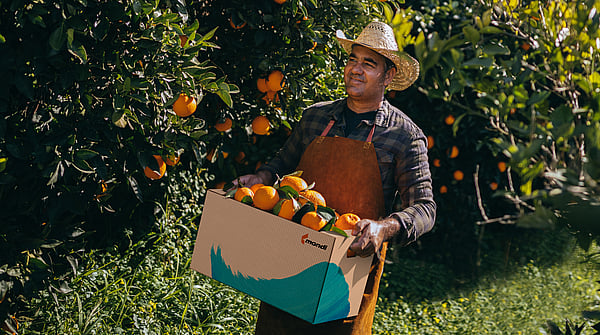Why does one third of the world’s food never make it to the table and how can packaging help?
.jpg?stamp=da00078c4e45e9c75c4880da93e344778b487a04)
In many Western countries, throwing away leftovers or discarding food with minor imperfections has become the norm. Yet, with more than 700 million people facing hunger globally and food insecurity rising, this waste is something we can no longer ignore1. The urgency of the issue is further highlighted by ongoing supply chain disruptions and economic instability.
The Issue
Food waste campaigner Tristram Stuart has said, “Cutting food waste is a delicious way of saving money, helping to feed the world and protect the planet.” 2 He’s right—addressing food waste is critical for people, the planet, and business. It is shocking that 1.3 billion tonnes of food are lost or wasted each year—enough to feed two billion people.1
In regions like Europe, nearly half of food waste occurs at the consumer level, whereas in developing countries, a significant proportion is lost post-harvest due to inadequate storage and poor packaging. Whether at the farm, in transit, or on supermarket shelves, food waste means wasted resources—water, energy, land, and capital.
The UN Climate Change estimates that food waste accounts for 8–10% of annual greenhouse gas emissions—almost five times more than the aviation sector—while also contributing to biodiversity loss and inefficient resource use, such as 30% of agricultural land and 6% of freshwater withdrawals3.
The Role of Packaging in Reducing Food Waste
At Mondi, we believe sustainable packaging can play a key role in tackling food waste. Smart packaging solutions help protect food during transport and storage, extending shelf life and preventing spoilage.
One example is the re/cycle RetortPouch; mono-material pouches are going to replace multi-layer and unrecyclable packaging for a variety of products. The aluminium used in most solutions has been substituted with innovative high-barrier films that keep temperatures high and maintain short processing times during the retort process. The packaging protects the product, allows remarkable shelf life and reduces potential food waste. For fresh produce, our corrugated solutions, like Coral Tray, MixBerry box (smaller portion solutions) or any bigger transportation trays with reinforced corners — all recyclable solutions — help reduce damage during transport while offering optimal ventilation. This prevents condensation build-up, which often occurs in plastic packaging, reducing the risk of mould. BIOhof Kirchweidach, one of our customers, notes for our CoralTray that “the stability of the packaging protects tomatoes from bruising, ensuring they reach consumers in perfect condition.”
Addressing Food Waste at Retail and Consumer Level
Food waste at the consumer level is often caused by excess buying, poor meal planning, and confusion over date labels. In Europe, the highest levels of food waste occur in meat, fish, and dairy, accounting for 29% of all food wasted. (WRAP, 2023)
Packaging plays a crucial role in preventing spoilage. Barrier properties in packaging help extend shelf life by protecting food from oxygen and moisture. Portion-controlled packaging also helps consumers buy only what they need.
To address this, Mondi has developed packaging solutions like the re/cycle Dried FoodsSachet for dried soups, spices and dehydrated beverages, offering ultra-high barriers while still helping customers meet their sustainability goals.
Balancing Sustainability with Performance
While reducing plastic waste is a priority, it’s important to balance this with the need to protect food and prevent waste. Innovations such as functional paper-based packaging, bio-based coatings, and compostable materials allow brands to make sustainable choices without compromising food safety.
For instance, re/cycle FunctionalBarrier Paper is a fibre-based alternative to plastic and can be used for dry, fresh and frozen food, ensuring products remain protected while recyclable in paper streams where facilities are in place. This type of innovation is crucial as supermarkets and brands move towards sustainable packaging solutions.
Moving Forward: Collaboration is Key
No single entity—whether government, business, or consumer—can tackle food waste alone. Collaboration across the entire supply chain is essential to drive change.
At Mondi, we work closely with customers to develop solutions that respond to consumer needs and answer legislative requirements, ensuring packaging is sustainable by design. By asking the right questions—from retailer requirements to recycling infrastructure—we develop solutions that balance business needs, product protection, and environmental impact.
To truly reduce food waste, we need to:
- Invest in smart packaging solutions that extend shelf life and reduce spoilage.
- Educate consumers on proper storage, meal planning, and date labels.
- Encourage businesses and retailers to adopt recyclable and resource-efficient packaging.
- Collaborate across the value chain to drive long-term solutions for food waste reduction.
As supply chains and economies continue to face challenges, the need to address food waste has never been more important. By working together—brands, manufacturers, and consumers—we can make a lasting impact in reducing food waste and ensuring a more sustainable future for all.
2. https://earth.org/quotes-about-food-waste/
Original article published 28 September 2020, updated 6 August 2025

More on retail packaging
Discover our shelf-ready and retail-ready packaging solutions that delight customers while enabling you to restock quickly and safely.


.jpg?stamp=b2ceae622f72dc2da8e17a888245634781297304)